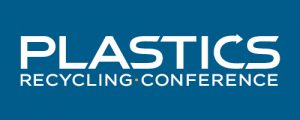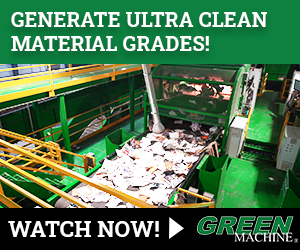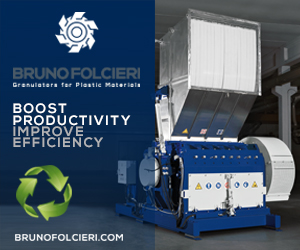
New Jersey is the latest state to look anew at recycled-content mandates as a way to force demand pull for recycled materials. | Real Window Creative/Shutterstock
New Jersey lawmakers approved legislation mandating recycled plastic be used in rigid containers, carryout bags and trash bags. Meanwhile, a West Coast advisory committee has recommended recycled-content requirements for plastic tubs, thermoforms and cups.
Those are among a handful of recent developments related to policy demanding use of recycled plastic in different ways.
New Jersey lawmakers pass mandate
New Jersey’s legislature will send to the governor a bill requiring post-consumer plastic be used in rigid containers, carryout bags and trash bags. S 2515, which received final votes in both the state Assembly and Senate on Jan. 10, requires the following:
- Rigid plastic containers (non-beverage): 10% PCR two years after the bill’s effective date. Then, after another three years (and every three years thereafter), the percentage increases by 10 percentage points until reaching 50%.
- Rigid plastic beverage containers: 15% PCR after two years. Then, after another three years (and every three years thereafter), the requirement increases by 5 percentage points until reaching 50% (except for beverages filled using a “hot fill process”; they would be capped at 30% PCR).
- Plastic carryout bags: 20% PCR after two years, and 40% PCR three years later.
- Trash bags: PCR requirements vary by bag thickness. After two years, the following requirements go into effect: 5% for bags between 0.70 mils and 0.80 mils thick, 10% for 0.80 mils to 1.00 mil thick, 20% for bags greater than 1 mil thick. After another three years, each of those percentage requirements will double.
The legislation gives the state’s Department of Environmental Protection (DEP) the power to adjust the targets after considering various factors, including changes in market conditions, recycling rates, availability of recycled resin, recycling infrastructure capacity and progress made by manufacturers.
The bill includes a number of key exemptions. Food packages (except for beverage containers) would be exempt from the recycled-content requirements for five years. The bill also completely exempts packaging for milk and plant-based milk beverages, medical food, food for special dietary use, and infant formulas.
The bill also bans polystyrene loose fill packaging, such as packing peanuts. It has other requirements for glass containers and paper bags, as well.
Additionally, the legislation requires the state to consult with the Association of New Jersey Recyclers and the New Jersey Clean Communities Program to launch a statewide recycling education campaign.
On Jan. 10, the Assembly voted 48-26 (with another three representatives not voting) to approve the bill. The Senate then immediately voted 22-15 in favor of the bill, which had originally passed by the Senate back in June 2021 but had subsequently been amended by the Assembly, which meant it required another Senate vote. The bill now heads to the desk of New Jersey’s Democratic governor, Phil Murphy.
The Institute of Scrap Recycling Industries (ISRI) released a statement praising the bill’s passage, saying that it “reflects a strong commitment to not only increase the use of recycled content in packaging materials, but to develop a sustainable program with quantifiable metrics and realistic goals.
Learn more in person
The upcoming Plastics Recycling Conference outside Washington, D.C. is set to include a two-part “Policy Perspectives” session on Monday, March 7. It will feature a number of leading voices who will break down lawmakers’ recycling focus at the state and national level, and what it all means for plastics processors and others. See complete details on the conference site and register today.
“This will help increase stakeholder commitment throughout the supply chain to ensure plastics are responsibly manufactured, collected, and recycled into new products,” the statement adds.
New Jersey is just the latest state to look at recycled-content mandates as a way to force demand pull for recycled resin, although not everybody thinks they’re a universally effective tool.
California and Washington state have already passed and signed bills imposing their own requirements. A packaging industry lobbyist previously said the New Jersey bill is more expansive than the West Coast policy efforts, according to Plastics News.
Recommendations in Washington
When Washington state lawmakers passed a bill requiring post-consumer resin (PCR) in beverage bottles, trash bags and some household products, they also asked stakeholders to recommend future recycled-content mandates.
A committee of stakeholders has now weighed in, backing recycled-content mandates for PP tubs, PET thermoforms, and single-use cups made out of PP, PET and PS.
The 32-member Stakeholder Advisory Committee recommended the following recycled content specifications for different product types:
- PP tubs: 10% PCR by 2026 and 30% by 2031.
- PET thermoforms for consumable goods: 10% PCR by 2026 and 30% by 2031.
- PET thermoforms for durable goods: 30% by 2031.
- PP single-use cups: 15% by 2029 and 25% by 2031.
- PET and PS single-use cups: 20% by 2029 and 30% by 2031.
The committee, which delivered its final recommendations in December, was made up of representatives from local and state governments, haulers and materials recovery facility operators, industry associations, plastic product manufacturers, environmental and environmental justice advocates, brand owners, and others. (The Association of Plastic Recyclers, which owns Plastics Recycling Update, participated.)
The bill, Senate Bill 5022, already set a number of PCR targets in statutes. For beverage containers (other than milk and wine), the requirements are 15% PCR by 2023, 25% by 2026 and 50% by 2031. For milk and wine, the requirements are 15% in 2028, 25% by 2031 and 50% by 2036.
For household cleaning and personal care products, the requirements are 15% PCR in 2025, 25% in 2028 and 50% in 2031. For trash bags, they are 10% by 2023, 15% by 2025 and 20% by 2027.
Draft of model legislation published
As more states look to pass laws requiring recycled plastic in products, a group of recycling officials in the Northeast has developed model legislation.
According to the Northeast Recycling Council (NERC), a group of state recycling officials have been working for the past 18 months to draft the model legislation, which has now been posted for public comment. The legislation covers recycled-content mandates for trash and carry-out bags, as well as food, beverage and household product containers.
The public is invited to submit comments until Feb. 11. Additionally, NERC and the Northeast Waste Management Officials’ Association (NEWMOA) will host a webinar on Jan. 13 to walk through the draft model legislation.
A version of this story appeared in Resource Recycling on January 11.
More stories about legislation
- Ameripen weighs in on draft federal labeling law
- Recycling firms unite to oppose reusable plastic bag ban
- Broad recycling legislation advances in Massachusetts




